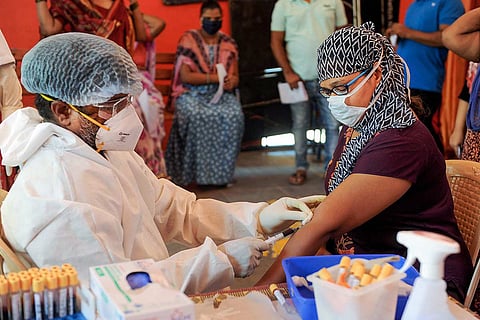

The COVID-19 pandemic has revived a longstanding debate in Andhra Pradesh over the legitimacy of the Rural/Registered Medical Practitioners or RMPs. With the increase in the number of COVID-19 patients in the state and the spread of infections beyond urban to rural areas, health department officials and district authorities are starting to rope in the RMPs to aid them in detecting COVID-19 patients.
However, medical and health professionals are objecting to the government's engagement with RMPs, expressing discomfort with legitimising the RMPs’ practice of what many doctors describe as ‘quackery’.
On Monday, Srikakulam District Collector J Nivas held a meeting with RMPs in the district, asking them to assist district health officials in keeping track of the patients with COVID-19 symptoms. He reportedly asked them to download a health department app to record names and addresses of patients visiting them. The collector called them a key part of the rural health system, according to Deccan Chronicle. However, doctors in the state have serious reservations about involving RMPs during the pandemic.
RMPs are typically individuals who have a few years of experience working with a medical professional. But usually, doctors say, RMPs have no medical qualifications but still set up healthcare practices, often in rural areas. AP Junior Doctors’ Association (APJUDA) President Dr N Deepchand says that while this is a result of lack of medical services in rural areas, RMPs have now turned into ‘quacks’, often causing harm to patients.
Dr Deepchand adds that RMPs are only qualified to administer injections, perform first-aid or supervise intake of medicines. “But on ground, they are often found treating all kinds of diseases and indiscriminately prescribing pills to patients who visit them,” he says. “It’s common in government hospitals to see patients coming in after an RMP has indiscriminately prescribed medicines which has had an adverse effect.”
Echoing Dr Deepchand’s views, Dr Sanjeev Singh Yadav, Telangana state secretary, Indian Medical Association (IMA), alleges that RMPs often tend to be quacks. “They have no official recognition from any medical authority or organisation. But they still set up their practice,” he says.
Because the government is now involving RMPs in tracking those with COVID-19 symptoms, government doctors at the PHC (Primary Health Centre) level are in turn being asked to monitor RMPs in their vicinity, and log information on the RMPs and their own patients on the health department’s app. For nearly a month now, the state Commissioner of Health and Family Welfare has been insisting that doctors monitor the RMPs and private village doctors this way, says Andhra Pradesh Government Doctors Association (APGDA) State Convenor Dr Jayadheer.
Asking doctors to monitor and log RMPs’ cases now is a step towards legitimising them, and equivalent to promoting quackery, doctors TNM spoke to state. “The doctors are already working in rural areas under difficult circumstances. By asking doctors to monitor the RMPs’ work, not only are they adding burden at a strenuous time, but also legitimising the harmful practice of RMPs,” says Dr Jayadheer.
The pandemic has revealed the inadequacies of the public health systems across states, particularly in terms of human resources, as admitted by health department officials themselves.
According to Dr Jayadheer, there are around 30,000 to 35,000 government doctors in the state, including PG doctors and house surgeons attached to government hospitals. The government has been recruiting more doctors, nurses, and paramedical staff to deal with the crisis. Doctors insist that to address gaps in rural healthcare as well, the government should recruit more ANMs (Auxiliary Nurse Midwife), ASHA workers (Accredited Social Health Activists), and more qualified doctors. “But they cannot directly involve RMPs in the medical field,” Dr Deepchand asserts.
However, while RMPs may not be entitled to provide healthcare during the pandemic, their potential role in gathering information and surveillance cannot be denied, argues Dr Srinath Reddy, President of the Public Health Foundation of India (PHFI). “Ultimately, if people are going to RMPs with COVID-19 like symptoms, the government does need to trace these patients,” he says, making a comparison to tracing people visiting pharmacies to buy medications for COVID-19 symptoms, and door-to-door surveillance by volunteers.
However, since an RMP will likely not have the medical expertise, consulting them at this time could be risky. “Right now, if a patient comes in with flu-like symptoms, it could be anything. It could be typhoid, malaria, dengue or even COVID-19. During the pandemic, we need to be even more careful not to allow fraudulent medical advice,” says Dr Jayadheer.
He adds that the doctors’ associations in the state are once again gearing up to demand the government to prohibit RMPs from providing healthcare, as they have been doing for a few years.